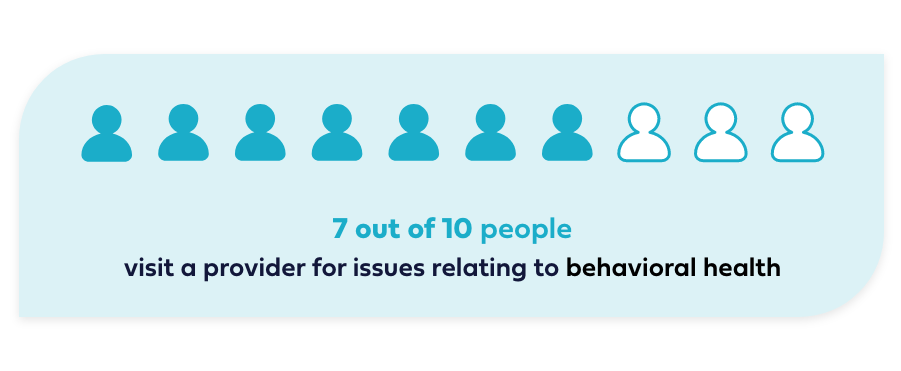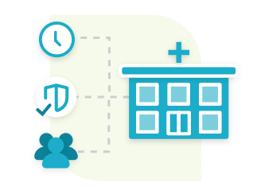Physical, mental, and emotional health are intertwined and interconnected. And yet, too often they are treated separately.
Individuals with chronic medical conditions are statistically more likely to experience mental health conditions, and having a mental health condition reduces the likelihood that an individual will receive adequate medical care or engage in healthy habits.
What is behavioral health?
Behavioral health is the practice of promoting behaviors and addressing the cognitive and emotional factors that contribute to mental and emotional well-being. Many people also expand the definition to include the practice of helping people overcome substance abuse and addictions.
One study found that 7 out of ten people who visit a provider are seeking help for issues related to behavioral health. That’s why healthcare models cannot afford to ignore them.

Any primary care model must address behavioral health
The Vera advanced primary care (APC) model has proven that behavior change is the core driver of improved health outcomes (learn more about behavior change and APC). It also demonstrates that, while providers and care teams can support a patient, the patient must be the one who decides to make positive steps in their life.
 But getting help for behavioral health issues isn’t always simple. While the stigma around doing so has gone down in recent years, it can still be a hurdle. Appointments are challenging to come by, as specialists are often in high demand and booked for months in advance. The problem is compounded if patients face other health issues, which become more difficult to address without behavioral health support.
But getting help for behavioral health issues isn’t always simple. While the stigma around doing so has gone down in recent years, it can still be a hurdle. Appointments are challenging to come by, as specialists are often in high demand and booked for months in advance. The problem is compounded if patients face other health issues, which become more difficult to address without behavioral health support.
However, if a patient can get help for their behavioral health issues within the trusted confines of a primary care relationship, their outcomes will improve for the following reasons:
- This form of care becomes normalized and easier to access, encouraging more patients to seek help.
- Providers are better able to treat interconnected issues alongside or in partnership with behavioral health experts.
- Patients can shift their focus towards making positive changes that will impact their long-term health and well-being.
How Vera integrates behavioral health into the APC model
 Vera’s APC model is built on a foundation of empathy, which means that providers and care teams form meaningful connections with their patients and build trusting relationships. Instead of rushed appointments focused on initial symptoms, Vera patients experience:
Vera’s APC model is built on a foundation of empathy, which means that providers and care teams form meaningful connections with their patients and build trusting relationships. Instead of rushed appointments focused on initial symptoms, Vera patients experience:
- Space to explore: Longer appointment times create room for important conversations, and providers are better able to uncover behavioral health issues through empathetic listening.
- Safety and trust: Relationships built on trust create the safe environment necessary for patients to request help with behavioral health issues.
- A team-based approach to care: Patients have support from a collaborative team to address all aspects of their health.
A provider alone cannot be expected to treat complex behavioral health issues that require specific expertise. At Vera, many care centers have integrated behavioral health services, with behavioral health clinicians working alongside providers, or directly with patients to ensure they receive the necessary level of care. Vera whole health coaches are also available to support patients in accomplishing lifestyle changes that can promote improved mental health.
In a traditional environment, 50% of people don't follow through on referrals, but an integrated, team-based approach improves the likelihood that they will.
“The Vera APC model is well designed to address the whole health of the patient, including both physical and mental health, because we incorporate empathetic listening in all that we do … It’s really about sitting down, listening, hearing what’s happening, and then engaging all the wraparound services that can benefit a patient.” — Sarah Oslund, PhD, Director of Integrated Behavioral Health, Vera Whole Health
Improved access to needed care
 Currently, the average wait time to see a therapist or psychiatrist can be anywhere from four to six months. For a patient in need of help, this can be a huge roadblock in their healthcare journey. With Vera’s integrated behavioral health model, patients can visit a specialist within one to two days for focused, evidence-based intervention.
Currently, the average wait time to see a therapist or psychiatrist can be anywhere from four to six months. For a patient in need of help, this can be a huge roadblock in their healthcare journey. With Vera’s integrated behavioral health model, patients can visit a specialist within one to two days for focused, evidence-based intervention.
Access to care is also available online. When patients require further intervention, Vera care teams provide help and support as they wait to get connected with a traditional therapist.
This holistic approach not only provides patients with the care they need at the moment but also with long-term support that takes into consideration every aspect of their physical, mental, and social health.

Editor's Note: This is an updated version of the original post published on May 28, 2020.